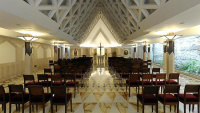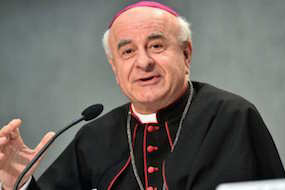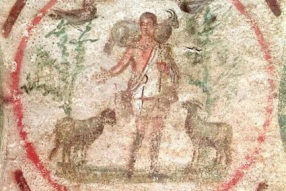Pope Francis: Old age is a time of grace

Catholic Grandparents Association founder, Catherine Wiley meets Pope
Thousands of senior citizens came to Rome today for a special gathering with Pope Francis in St Peter's Square. They exchanged testimonies and listened to the Holy Father’s reflections on the importance, the struggles, and the beauty of old age. There were grandparents, elderly clergy and religious, including Pope-emeritus Benedict XVI and single people. Among the married couples there were some Christian refugees from Iraq.
Pope Francis said: “Old age, in particular, is a time of grace, in which the Lord will renew His call. He calls us to preserve and transmit the faith, calls us to pray, especially to intercede; calls us to be close to those who maybe in need.”
The Holy Father went on to warn against losing sight of and appreciation for the inestimable worth of those, who are in the twilight of life. “A people that does not have care for the elderly, that does not treat them well, has no future: such a people loses its memory and its roots.”
The key role of grandparents in passing down the faith to a new generation was another major theme of Pope Francis' address. The founder of the Catholic Grandparents Association, Catherine Wiley also gave an address (text coming soon).
A Vatican Radio translation of the Pope's talk follows:
Dear brothers and sisters, good morning!
I thank you for coming in such large numbers! And thank you for your festive welcome. Today this is your celebration. It is our celebration! I thank His Excellency Archbishop Vincenzo Paglia, President Pontifical Council For the Family and all those who have prepared this ceremony.
I listened to the testimonies of some of you and was struck by the common experiences of many seniors and grandparents. But one was different: that of the brethren from Erbil. They escaped violent persecution in Iraq. To all of them we say together, "thank you" It is really special that you have come to be with us here. This is a gift to the Church. In turn, we offer you our sympathy, our prayers and practical help. It is inhuman to abuse Elders just as it is inhuman to abuse children. But God will not abandon you. He is with you! With God’s help, you are and will continue to be the memory for your people; and also for us, the great family of the Church. Thank you!
These brethren here testify that even in the most difficult tests, the elderly who have faith are like trees that continue to bear fruit. And this is true even in the most ordinary of situations where, there may be other forms of temptations and other forms of discrimination. We have heard some such witnesses today.
Old age, in particular, is a time of grace, in which the Lord will renew his call: calls us to preserve and transmit the faith, calls us to pray, especially to intercede; calls us to be close to those who maybe in need. The elderly – grandparents [especially] – have a capacity to understand the most difficult situations: a great ability – and when they pray for these situations, their prayer is strong. It is powerful.
To Grandparents, who have been blessed to see their children's children (cf. Ps 128.6), to them are entrusted an even greater task: to convey the experience of life, the story of a family, the story of a community or even of a people; to share with simplicity their wisdom and the same faith which is the most precious legacy! Blessed are those families who have grandparents nearby! The grandfather is in a way twice a father and the grandmother is twice a mother.
But it is not always the case that the elderly, the grandfather, grandmother has a family that can accommodate them or upon which they can count. So we welcome the houses for the elderly ... so that they can truly be homes, not prisons! We hope that these homes will truly serve the interests of older persons and not the interests of someone else!
There must never be institutions where the elderly are forgotten, hidden or neglected. I feel close to the many elderly people who live in these institutions, and I think with gratitude of those who go to visit them and take care of them. Homes for the elderly should be the "lungs" of humanity in a country, in a neighborhood, in a parish; "sanctuaries" of humanity where those who are old and weak are cared for and taken care of like a brother or a sister. It's good for you to go and visit senior citizens! Look at young people: sometimes seem miserable and sad: Go visit an elderly person and you will become joyful!
But there is also the reality of the abandonment of the elderly: how many times we discard older people with attitudes that are akin to a hidden form of euthanasia! The culture of discarding human beings hurts our world. We discard children, young people and older people under the pretense of maintaining a "balanced", economic system the center of which is no longer the human person, but money. We are all called to counter this culture of poisonous waste!
We Christians, together with all people of good will, are called to patiently build a more diverse, more welcoming, more humane, more
inclusive society, that does not need to discard the weak in body and mind. On the contrary we need a society which measures its success on how the weak are cared for.
As Christians and as citizens, we are called to envision, with imagination and wisdom, ways of dealing with this challenge. A people who do not take care for grandparents, does not treat them well has no future: such a people loses its memory and its roots. But beware: you too have the responsibility to keep alive these roots in yourself with prayer, the reading of the Gospel and the works of mercy. It is only is such a manner that we will remain as living trees, that even in old age will not stop bearing fruit.
The official translation of today's Homily Pope Francis' Mass for the Elderly follows:
Today we accept the Gospel we have just heard as a Gospel of encounter: the encounter between young and old, an encounter full of joy, full of faith, and full of hope.
Mary is young, very young. Elizabeth is elderly, yet God’s mercy was manifested in her and for six months now, with her husband Zechariah, she has been expecting a child.
Here too, Mary shows us the way: she set out to visit her elderly kinswoman, to stay with her, to help her, of course, but also and above all to learn from her – an elderly person – a wisdom of life.
Today’s first reading echoes in various ways the Fourth Commandment: “Honour your father and your mother, so that your days may be long in the land that the Lord your God is giving you” (Ex 20:12). A people has no future without such an encounter between generations, without children being able to accept with gratitude the witness of life from the hands of their parents. And part of this gratitude for those who gave you life is also gratitude for our heavenly Father.
There are times when generations of young people, for complex historical and cultural reasons, feel a deeper need to be independent from their parents, “breaking free”, as it were, from the legacy of the older generation. It is a kind of adolescent rebellion. But unless the encounter, the meeting of generations, is reestablished, unless a new and fruitful intergenerational equilibrium is restored, what results is a serious impoverishment for everyone, and the freedom which prevails in society is actually a false freedom, which almost always becomes a form of authoritarianism.
We hear the same message in the Apostle Paul’s exhortation to Timothy and, through him, to the Christian community. Jesus did not abolish the law of the family and the passing of generations, but brought it to fulfillment. The Lord formed a new family, in which bonds of kinship are less important than our relationship with him and our doing the will of God the Father. Yet the love of Jesus and the Father completes and fulfils our love of parents, brothers and sisters, and grandparents; it renews family relationships with the lymph of the Gospel and of the Holy Spirit. For this reason, Saint Paul urges Timothy, who was a pastor and hence a father to the community, to show respect for the elderly and members of families. He tells him to do so like a son: treating “older men as fathers”, “older women as mothers” and “younger women as sisters” (cf. 1 Tim 5:1). The head of the community is not exempt from following the will of God in this way; indeed, the love of Christ impels him to do so with an even greater love. Like the Virgin Mary, who, though she became the mother of the Messiah, felt herself driven by the love of God taking flesh within her to hasten to her elderly relative.
And so we return to this “icon” full of joy and hope, full of faith and charity. We can imagine that the Virgin Mary, visiting the home of Elizabeth, would have heard her and her husband Zechariah praying in the words of today’s responsorial psalm: “You, O Lord, are my hope, my trust, O Lord, from my youth… Do not cast me off in the time of old age, do not forsake me when my strength is spent... Even to old age and grey hairs, O God, do not forsake me, until I proclaim your might to all the generations to come” (Ps 71:5,9,18). The young Mary listened, and she kept all these things in her heart. The wisdom of Elizabeth and Zechariah enriched her young spirit. They were no experts in parenthood; for them too it was the first pregnancy. But they were experts in faith, experts in God, experts in the hope that comes from him: and this is what the world needs in every age. Mary was able to listen to those elderly and amazed parents; she treasured their wisdom, and it proved precious for her in her journey as a woman, as a wife and as a mother.
The Virgin Mary likewise shows us the way: the way of encounter between the young and the elderly. The future of a people necessarily supposes this encounter: the young give the strength which enable a people to move forward, while the elderly consolidate this strength by their memory and their traditional wisdom.
Source: Vatican Radio





















